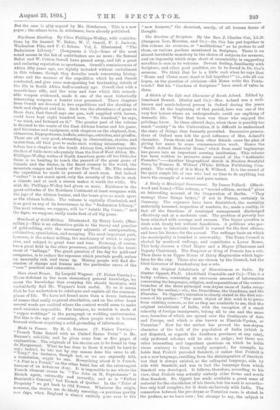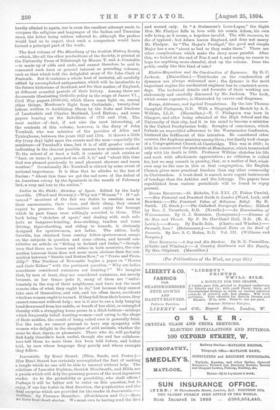On the Original Inhabitants of Bharatavarea or India. By Gustav
Oppert, Ph.D. (Archibald Constable and Co.)—This is a bulky volume, containing an enormous amount of information concerning the languages, religion, and superstitions of the variou s branches of the three principal non-Aryan races of India recog- nised by the author,—viz., the Dravidian, the Gaudians, and the Bharatae. Dr. Oppert's intention ie clearly stated in the first sen- tence of his preface : " The main object of this work is to prove from existing sources, so far as they are available to me, that the original inhabitants of India, with the exception of a small minority of foreign immigrants, belong all to one and the same race, branches of which are spread over the Continents of Asia and Europe, and which is also known as Finnish-Ugrian, or Turanian." How far the author has proved the non-Aryan character of the bulk of the population of India (which is not disputed, as regards the Southern provinces at any rate), only profound scholars will be able to judge ; but there are other interesting and important questions on which he holds views contrary to those usually accepted ; for example, he holds that Prakrit preceded Sanskrit, or rather that Prakrit is not a new language, resulting from the disintegration of Sanskrit but that it always existed, as the colloquial language, side by side with Sanskrit, and was in fact the language from which Sanskrit was developed. It follows, therefore, according to his view, that Prakrit may actually embody older forms and words than. Sanskrit. Dr. Oppert has made available a great mass of material for the elucidation of his thesis, but his work is neverthe- less only half complete, for it deals exclusively with India. The connection between the pre-Aryan or Turanian races is stated in the preface, as wo have seen ; but strange to say, the subject is
hardly alluded to again, nor is even the smallest attempt made to compare the religions and languages of the Indian and Turanian races, the latter being seldom referred to, although the preface would lead us to expect that such a comparison would have formed a principal part of the work.

































 Previous page
Previous page